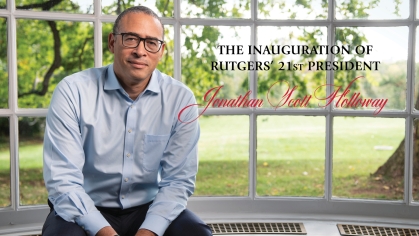Chancellor Cantor Named to Carnegie Foundation Commission on Underrepresented Students
Rutgers-Newark Chancellor Nancy Cantor is among higher education leaders named to the newly created Carnegie Postsecondary Commission, which will focus on helping underrepresented and under-resourced students achieve goals and secure careers.
The appointment was announced by the Carnegie Foundation for the Advancement of Teaching, in partnership with the XQ Institute.
Composed of diverse leaders in higher education as well as K12, commission members aim to identify the most effective ways to help millions of low-income, underrepresented, and first-generation college students.
The Commission will focus on scalable, affordable, career-aligned higher education models; technology-powered teaching and learning methods; pathways that blur the boundaries between secondary, postsecondary, and work; and policy ideas that promote equity and greater opportunity for low-income, underrepresented, and first-generation students.
“The Carnegie Postsecondary Commission is coalescing at a pivotal moment for American higher education—indeed for America as a whole—as decades of progress on expanding educational opportunity are now in jeopardy in so many states and nationally,” said Cantor.
“The commission will focus attention on how we can work collaboratively across sectors to strengthen our institutions, our communities, and our nation by assuring genuinely equal educational opportunity for all,’’ she said. “ I look forward to pooling ideas and forging action plans with the stellar, diverse group of leaders that the Carnegie Foundation and American Council of Education have assembled to do this vitally important work.”
For the next two years, the Commission will create a series of “action papers” to provoke critical discussion, create visibility, and spur action for innovative solutions to make the postsecondary sector a more vital engine of upward mobility and economic opportunity. The Commission will also promote and draw attention to some of the country’s most promising ideas, models, and solutions so that they may be scaled widely in more settings.
The Commission will also provide guidance on the issuance of newly constructed Carnegie Classifications for every institution of higher education (IHE) in the nation, in partnership with the American Council on Education. The aim of this endeavor is to focus IHEs on their essential purpose, catalyze public capital distribution to institutions that accelerate economic mobility, shape federal and state policy, and learn from institutions that are true generators of opportunity.
“This Commission mobilizes a cohort of innovative leaders who understand that the educational ecosystem in this country is falling far short of its promise for students from all walks of life,” says Commission Co-Chair Shirley M. Collado, President & CEO of College Track and Carnegie Senior Fellow. “By pulling this group together, we are harnessing the lived expertise of thinkers who frequently operate outside of the usual channels—leaders whose collective ingenuity and vision will translate into the bold solutions we need to effect systemic change.”
Co-Chair Dr. Tuajuanda C. Jordan, St. Mary’s College of Maryland President states, “An engaging and holistic educational experience is the great democratizer. In this country, we have the potential to make this a reality but have continually fallen short. Solving persistent challenges requires an understanding of the systems that perpetuate the issues, experience successfully navigating the complexities, and a propensity for creative thinking. The members of the Commission exhibit all these characteristics. Individually, each has forged a path that has lowered the barriers to success for future generations.”
Carnegie Foundation President, Dr. Tim Knowles adds, “Building more affordable, experiential and engaging pathways from high school to postsecondary education and career is essential to the American economy and democracy. The Carnegie Postsecondary Commission brings together a group of extraordinary leaders together - spanning K12 and higher education - to help shape and propel the ideas that can make this happen.”


